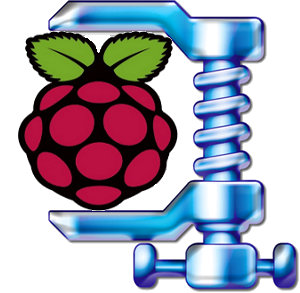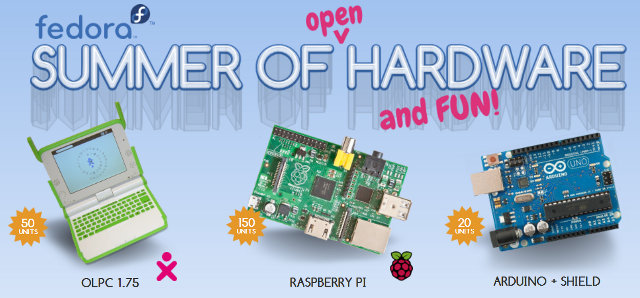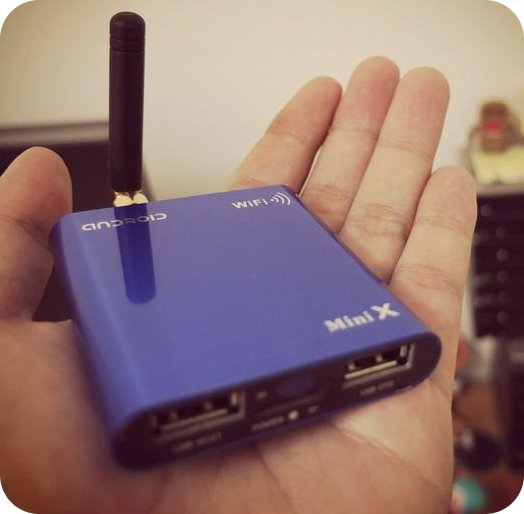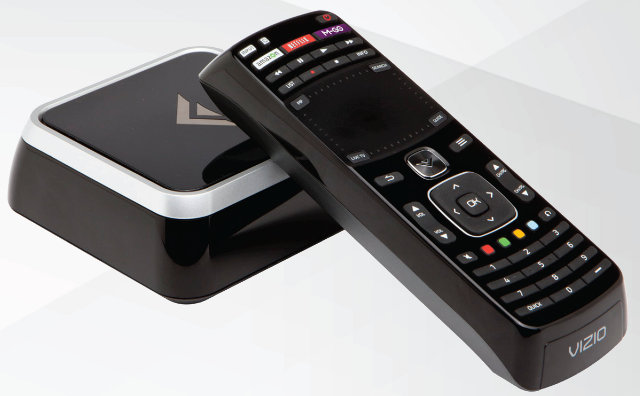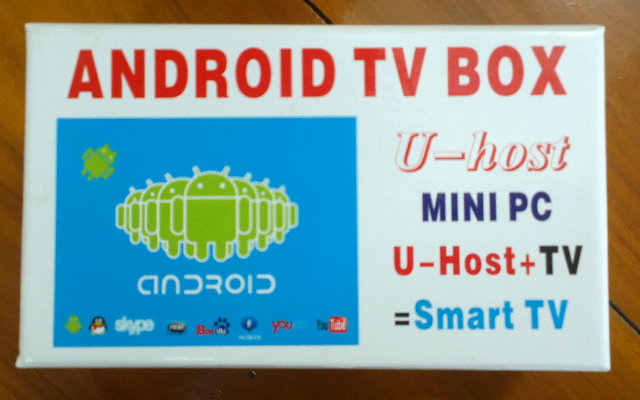Many embedded systems applications do not require a desktop environment or graphical interface on the screen (e.g. server), and you may want to only install the files you really need on the SD card either to reserve as much space as possible for data and/or your program or to reduce costs. After searching for a minimal image based on Raspbian ARMHF distribution for the Raspberry, I could only find Linux Systems minimal image based on the Alpha version of the Raspbian Wheezy. Their compressed image is 109 MB in size, has a custom kernel, sshd and ntpd are enabled, but the wireless tools were deleted, and at the time the swap was located in another partition instead of a file inside the rootfs. The uncompress rootfs is about 414 MB (as reported by df -h when mounted as a loop device). I decided to prepare a minimal image myself based […]
Fedora To Give Away Raspberry Pis, OLPC 1.75 Laptops and Arduinos to Developers
Fedora will give away over 200 open hardware devices as part of its Summer of Hardware initiative to Fedora contributors. 150 Raspberry Pi boards, 50 OLPC 1.75 laptops and 20 Arduino boards and shields will be freely distributed to randomly selected candidates. In order to qualify, you must have a Fedora Project account, have signed the Fedora Project Contributor Agreement, be a member of at least one non-CLA / FPCA Fedora Group and be resident in one of the following country/region: Australia (excluding the states of New South Wales and the Australian Capital Territory), Belgium, Canada (excluding Quebec), Germany, India, Japan, the Netherlands, New Zealand, Singapore, South Korea, Spain, Sweden, United Kingdom, or the United States (excluding New York and Florida). To apply, you need to fill an application form by the 15th of August where you select your preferred device and enter your full name, Fedora account information and […]
$77 Mini Xplus Media Player with Android 4.0 and 1GB RAM
I previously wrote about Mini X media player, an Android mini Media Player powered by AllWinner A10 with 512 MB RAM that runs Android 2.3. Its price has been reduced by about $10 to $67.60, and it now has a big brother called Mini Xplus that looks exactly the same except it runs Android 4.0 and comes with 1GB RAM according to Deal Extreme. Here are the device specifications based on Deal Extreme overview: CPU – AllWinner A10 (Cortex A8) with Mali-400 GPU @ 1.2 GHz Memory – 1GB DDR3 RAM Storage – 4GB NAND Flash, microSD slot Video Output – HDMI 1.3 and Composite USB – 2x USB 2.0 host Connectivity – WiFi 802.11 b/g/n Video Formats – MKV, TS, TP, M2TS, RM/RMVB, BD-ISO, AVI, MPG, VOB, DAT, ASF, TRP, FLV etc Video Codecs – MPEG1/2/4, H.264, VC-1, Divx, Xvid, RM8/9/10, VP6 Subtitle – SRT, SUB, IDX, SSA, SMI […]
Vizio Co-Start (VAP430) Google TV Stream Player
First announced at CES 2012, the Vizio VAP430 stream player featuring Google TV 2.0 has become available for pre-order for $99 last week. Here are the specs provided on Vizio website: Video Resolution Supported – 720p, 1080i, 1080p 3D Support – Yes Video Playback – H.264, MP4, MKV Audio Music Playback – MP3, AAC, WMA Audio Features – Up to 5.1 surround sound pass-through Connectivity WiFi – 802.11 n/g/b Bluetooth Ethernet – 10/100 Mbps Connections HDMI In – Connection to Cable or Satellite Box HDMI Out – Connection to TV One USB 2.0 Host port Remote control – Built-In IR Blaster, Bluetooth, Touchpad and Keyboard Dimension – 10.67 x 4.06 x 10.67 cm Weight – 300 grams They did not provide information about the processor, RAM and flash used, but I would guess it’s based on Marvell Google TV Reference Platform which is powered by ARMADA 1500 HD Secure Media […]
Android Jelly Bean on Samsung Origen Development Board (Video)
Linaro Android team has started to port Android Jelly Bean to Samsung Origen board (powered by Exynos 4 dual core processor) and can now show Android 4.1 running on the board with hardware accelerated graphics. This is a preliminary image: the touchscreen, graphics, adb works, and you can use keyboard and mouse as input devices, but Wi-Fi, Bluetooth and multimedia (hardware video decoding) still have to be worked on. If you have an Origen board, you can give it a try by downloading the binaries @ https://android-build.linaro.org/builds/~linaro-android/origen-jb-gcc47-samsunglt-stable-blob/, and follow the instructions to create a bootable SD card with linaro-media-create.
Smallart U-Host mini PC Unboxing and Review
I’ve just received a Smallart Uhost mini PC based on AllWinner A10 from the “The Cubies hacker shop” on Aliexpress. The device features 1GB RAM, 4B flash, includes 802.11 b/g/n built-in, USB ports, HDMI output and a microSD card. It costs $70 including shipping. I received the device in the simple package below. There is a whole bunch of stuffs inside the package. A USB to mini USB cable for power and to connect the device to PC to act as a USB drive, the Smallart U-host mini PC itself, a user manual in English, the power supply 5V/2A with a USB port, an HDMI female to male cable. The USB to mini USB cable has actually 2 large USB connector in order to provide up to 5W power (2 x 500mA x 5V). The mini PC has several connectors including an HDMI male connector, a USB Host port (for […]
Linaro 12.07 Release with Kernel 3.5 and Android 4.0.4
Linaro has released version 12.07 based on Linux Kernel 3.5-rc3 and Android 4.0.4. Some work has been done on Jelly Bean (but the port is for next month), several benchmark tools have been added to LAVA as Linaro wants to provide standard benchmarks for Android, Linaro ALIP image now uses LXDE by default with a smaller image and improved performance, and Open Embedded images are now available (minimal and LAMP stack). Here are the highlights of the release: Android Jellybean baselines for Galaxy and Panda with Linaro extra’s available Android Benchmarking apps were deployed for pandaboard, snowball and origen in LAVA including: vellamo, quadrant, nbench, linpack, glbenchmark, geekbench, caffeinemark, antutu, andebench Improved native Benchmarks variance on Android to 1%, working on Java variance ICS “tests” builds now produced by default and test lists generated Open overlay tarballs working pm-qa’s cpuidle cpufreq cpuhotplug sched_mc suspend integrated into the Android builds Linaro […]
VIA Releases Kernel 2.6.32 and U-Boot Source Code for $49 APC Board
VIA Technology unveiled the low cost APC (Android PC) board based on WonderMedia WM8750 processor (ARM11) back in May, and started to ship the Android board this month (I think since that was their plan). The company has just released Kernel 2.6.32.9 and U-Boot source on github. Here’s how to retrieve the code provided git is already installed on your machine:
|
1 |
git clone git://github.com/apc-io/apc-8750.git |
You can then build U-Boot (provided you’ve already installed an ARM toolchain in your path):
|
1 2 3 |
cd $CURRENT_PATH/u-boot make wmt_config make all |
and the Linux kernel:
|
1 2 3 |
cd $CURRENT_PATH/kernel make 8710_defconfig make ubin |
The availability of the source means we should see Linux distribution like Debian, Fedora or Arch Linux ARM (separate from Arch Linux) running on the board very soon. In theory, it’s also possible to run a Linux distribution with the binary Linux kernel compiled for Android, but it causes some issues and also makes customization more difficult. I think they should also have release the code they modified […]


